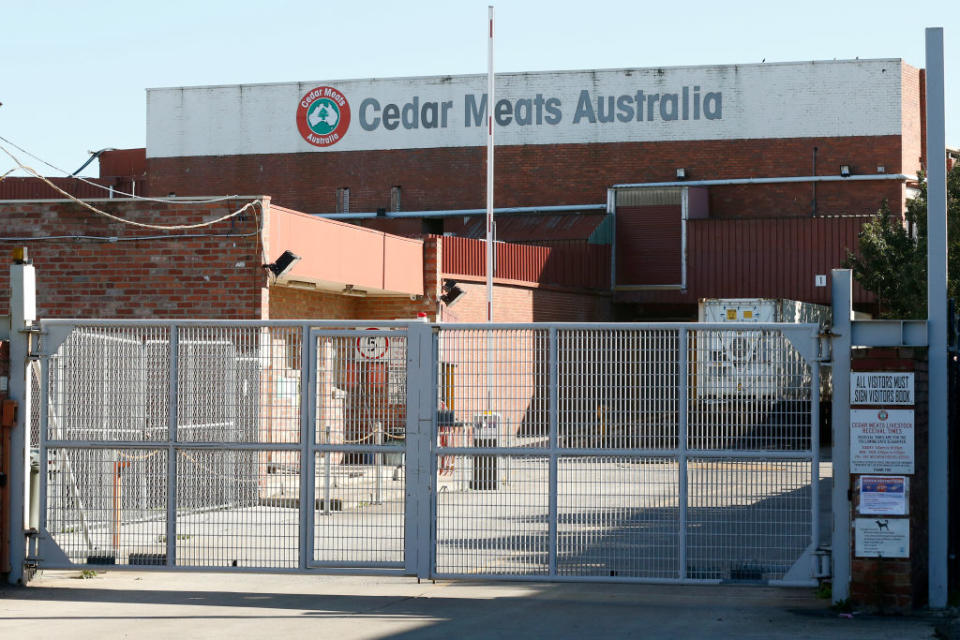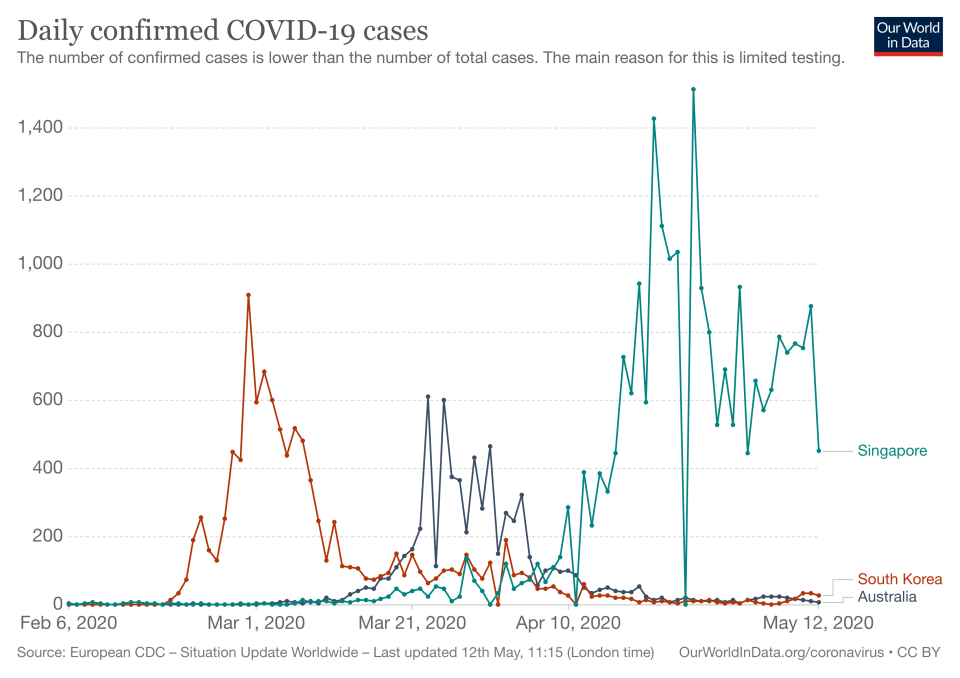Coronavirus: Three mistakes Australia must avoid to prevent second wave
Australia should be looking to other countries for “cautionary tales” as it eases lockdown restrictions and the coronavirus curve flattens.
Many countries overseas who have experienced soaring numbers of coronavirus cases, such as Germany and the UK, have started easing lockdown as Australia too announced rules would be relaxed.
But with this comes the risk of a spike in coronavirus cases and the feared second wave of outbreaks.
So what ‘mistakes’ have other countries made and what lessons can Australia learn to ensure cases can remain controlled.
Singapore’s ‘real loss of control’
Professor Benjamin Cowie, infectious disease specialist and co-head of public health at the Doherty Institute, told Yahoo News Australia things took a disastrous turn for Singapore after it was held as one of the top examples of how to best control the virus.
Singapore was praised for its fast response to slow its infection rate. It had a response ready due to the outbreak of SARS in 2002-03 and started getting prepared when the globe was made aware of the first case in China back in December.
However there was a mistake Singapore made and last month its cases surged past 9000 due to a growing number of infections in migrant workers.
The city-state managed to keep its outbreak in check in the early stages due to widespread testing and contact-tracing, but it slipped up by not giving foreign workers the same access to healthcare.

“Singapore has seen a real loss of control of its COVID-19 response,” Professor Cowie said.
“Subsequently it was determined a lot of testing wasn’t accessible to large numbers of foreign workers who were in Singapore and living in quite cramped conditions.
“The access to heathcare and adequate housing for those workers is not what you would hope for countries like Singapore. It led to a significant outbreak of COVID among those workers and now broader in the community.”
There are currently more than 24,000 cases in Singapore and 21 deaths.
The lesson for Australia
“It’s a cautionary tale, those who don’t have access to healthcare may not have the same access to testing,” Professor Cowie said.
“There needs to be liberal access to free testing and free healthcare for anyone, not just the people with Medicare access, so there are no social barriers for people seeking testing and treatment.”
Employees in Germany going to work sick
Professor Cowie said Germany had been successful in controlling the spread of the coronavirus compared to other European counterparts like Italy, France and the UK, but recent outbreaks triggered concerns it might have to reimpose relaxed restrictions in some parts of the country.
“A couple of those outbreaks have notably been at meatworks and abattoirs, which is particularly relevant to the Cedar meatworks outbreak in Victoria,” he said.

“Many of the workers in Germany were migrants and may have been employed through labour hire. It’s arguably insecure meaning they may not have access to sick leave and may be concerned about ongoing employment if they call in sick or test positive.
“I think the real cautionary part of that is outbreaks in particularly vulnerable populations, like in prisons, aged care facilities or meatworks, can see a loss of the control.”
The lesson for Australia
Professor Cowie said using the outbreak at the Victoria meatworks as an example, it was clear in some circumstances cases earlier on weren’t recognised as being associated with the meatworks due to labour hire.
“It seems the government did not speak directly to the meatworks and there was a breakdown in communication,” he said.
“Having the ability to rapidly respond to focal outbreaks is increasingly important.
“There needs to be high degrees of access to testing put in place and isolation measures to prevent transmission to broader communities. I think that’s the cautionary tale.”
“Taking Victoria as an example, the health departments and government setting up rapid response teams for outbreaks, it was clear in some circumstances cases earlier on weren’t recognised as being associated with that meatworks due to labour hire,” Professor Cowie said.
Nightclub cluster causes spike in South Korea
South Korea announced its biggest spike in coronavirus infections in more than a month on Monday, driven by a cluster at Seoul nightclubs and forcing authorities to delay this week's planned reopening of schools.
The country has been held up as a global model in how to curb the virus, but over the weekend its capital – as well as neighbouring Gyeonggi province and the nearby city of Incheon – ordered the closure of all clubs and bars after a burst of new cases sparked fears of a second wave.
Authorities are scrambling to track down thousands of people who visited venues in the Itaewon entertainment district.

South Korean officials reported 35 new cases on Monday, taking its total to 10,909, after recording only single-digit increases for eight of the preceding 12 days – many of them overseas arrivals.
Now 86 cases have been linked to the nightlife cluster, the Korea Centres for Disease Control and Prevention said.
The lesson for Australia
“It’s led to the need to rapidly contact trace and try and prevent further outbreaks associated with nightclubs,” Professor Cowie said.
“Again, this is a cautionary tale as Australia does lift restrictions. I don’t see Australia moving to having nightclubs full of people any time soon and this would back up the government’s approach to start out slow and learn as we go.
“Lift the restrictions gradually rather than going right back to social mixing.

“From an infectious diseases point of view, it comes down to contact with an infectious person and the potential amplification and the need to contact trace and control.
“The knock-on effect really becomes a big issue very quickly.”
Professor Cowie said Australia should be careful looking at other countries and thinking we’ve done better than them.
“We haven’t had the same problems but it’s no means over. We can’t be complacent. We’re not out the other side – in fact we may be at the end of the first beginnings,” he said.
“When we look at other countries and what happened there and say, ‘well that was bad for them lucky we didn’t go there’ – well we are going to be dealing with pandemic aspects for the rest of the year and next year and it will touch a lot of how we live in the next couple of years and potentially beyond.
“Drawing a comparison to countries who have done worse could come back and bite us if we don’t continue to think about questions and allow a sense of complacency. If that happens we may find ourselves in a really bad situation we don’t want to be in.”
With AFP
Do you have a story tip? Email: newsroomau@yahoonews.com.
You can also follow us on Facebook, Instagram and Twitter and download the Yahoo News app from the App Store or Google Play.





